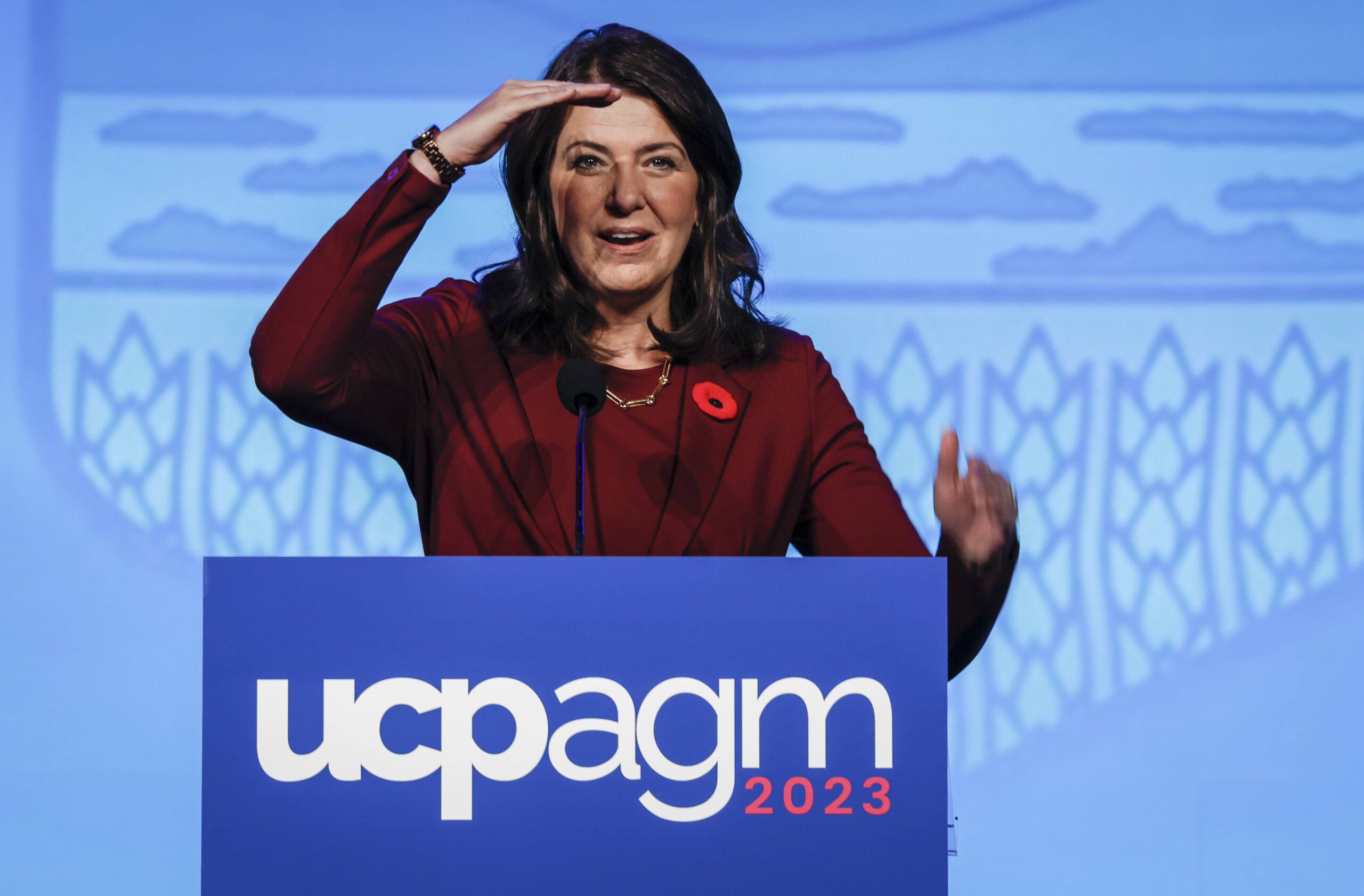Alberta’s United Conservative Party held their biennial policy convention on the first weekend of November and, not unexpectedly, anti-trans policies, along with a number of other supposedly “anti-woke” policies were all voted on by the party membership in overwhelming numbers. Big and small-c conservative parties across the country are embracing these beliefs, in ways that are increasingly ignored by legacy media—Pierre Poilievre recently spoke in Richmond Hill, Ontario, about Justin Trudeau imposing “radical gender ideology” on children, and nobody in the major media outlets said anything for nearly a week. It was only a matter of time before Alberta premier Danielle Smith would be enticed to join that pack, in spite of the fact that she has tried not to politicize trans issues in the province.
“I want every parent listening today to hear me loud and clear: parents are the primary caregivers and educators of their children,” Smith told the almost 3,800 convention delegates to a standing ovation. “We cannot have a successful province or a successful society without strong and nurturing families. And regardless of how often the extreme left undermines the role of parents, I want you to know that parental rights and choice in your child’s education is—and will continue to be—a fundamental core principle of this party and this government. We will never apologize for it.”
So much for the assurances that because she has a non-binary family member and that a senior civil servant in the province is trans, that she was going to resist this kind of jingoism. It didn’t take much for Smith to renounce any kind of principles she may have held, and there is little doubt that she has reason to fear her grassroots base. Why? Because of what they did to Jason Kenney in the wake of the pandemic restrictions that “forced” up on the province, even though they were among the weakest and most permissive in the country, by deposing him in a leadership review that allowed Smith to take the reins in the first place.
Part of this has to do with how the UCP came into being in the first place. The provincial NDP won power in 2015, somewhat accidentally owing to a number of factors, not the least of which was voter anger that the reigning Progressive Conservatives had the audacity to tell people to “look in the mirror” when it came to their demands for both low taxes and the highest level of government services. At that point, certain conservative luminaries, including Jason Kenney, took the wrong lesson. They believed that the problem was that conservatives in the province were divided between the largely amorphously centre-right PC party, and the further-right Wildrose Party that Smith previously led, and who had managed to defeat themselves because Albertans balked at candidates talking about gay people suffering an eternity in a “lake of fire.” And so, Kenney in particular set about to “unite” these factions.
The divide was never really the problem. The problem was that after over four decades of one-party rule, the PCs were exhausted, corrupt and needed a few years in the penalty box to come up with some new ideas and some fresh blood. Instead, bringing in the hard-right Wildrose faction allowed that group the legitimacy that they had previously been denied, and with that taste of power, they started to make irrational demands that fit with the kind of culture-war MAGA diet that they had been consuming online. And Kenney realized too late this problem, as the leopards he invited into the house started eating his face, as he warned about the “lunatics taking over the asylum” on his way out the door.
“The political fringes, particularly social conservatives and far-right elements, are feeling particularly empowered, and are finding it pretty easy to take over parties because they have a motivated base who will show up and who are willing to spend money to further their cause”
Leading the charge of this fringe membership base that took out Kenney and secured Smith’s leadership is a group that calls themselves “Take Back Alberta,” and they ensured that the policy resolutions at this month’s convention were full of the kind of culture-war, conspiracy-theory-laden policies that look like they largely came from the fevered imagination of Fox News hosts than a serious political party. Not only that, but Take Back Alberta members engineered a takeover of the grassroots party mechanism, so that they now control the party presidency and key positions, with an eye to ensuring that Smith will be forced to enact these kinds of policies. There is a level of menace associated with that because of how they pushed Kenney out the door, when he essentially founded the party.
The lesson that we should be paying attention to is that the political fringes, particularly social conservatives and far-right elements, are feeling particularly empowered, and are finding it pretty easy to take over parties because they have a motivated base who will show up and who are willing to spend money to further their cause. This is in large part because the more centrist elements of the conservative movement, but not exclusively, have become complacent and haven’t been doing the work of organizing and ensuring that they can be the dominant, moderating forces that have tended to win governments in this country. And it’s not just Alberta—this is the same fringe that Pierre Poilievre staked his leadership on, and he handily won the top spot in the party, and is trying to keep appeasing these fringes in the hopes that they will give him just enough votes to edge out the Liberals in a way that appealing to the centre won’t do.
This is a broader societal problem that we need to be addressing. For decades now, we’ve been taught that slacktivism like signing petitions or voting once every few years is enough, but it’s not. The fact that most people don’t know enough about joining parties and doing the grassroots organizing that is the lifeblood of politics has allowed party leaders to centralize power, and fringe groups to exert outsize influence. That is going to mean even more extreme policies coming because they feel emboldened, particularly if we see the return of Trump in the U.S. or the election of a Poilievre-led federal government in this country, unless we get more sensible people organizing and ensuring that these fringe voices are relegated back to the margins where they belong.
Want to suggest a correction or have feedback? Click here


 Why you can trust Xtra
Why you can trust Xtra


